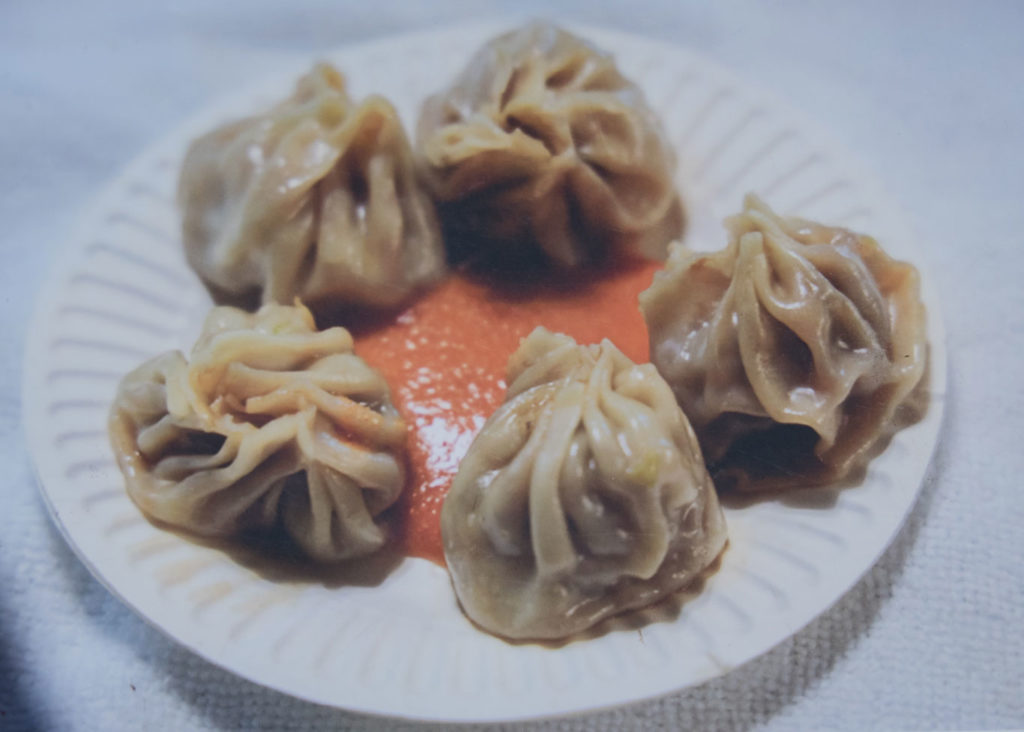Meet Ratna Subba from Nepal
Ratna Subba is the owner of the food truck Darjeeling Momo. He has an infectious smile and makes you feel at ease the moment you’re around him. He was born in Bhutan but fled from the country to Nepal with his mother and sisters in 1992 when he was 7. Like many other refugees from Bhutan, he lived for nearly 20 years in refugee camps in Nepal. His ancestors built roads from Nepal to Bhutan but stayed in Bhutan.
Starting over in Idaho
When he first came to Idaho, Ratna worked at Momo Dumplings restaurant in Meridian. But when the owners returned to Nepal to help family after the earthquake of 2015, he was left without a job. With the help of his family and EO, Ratna bought a food truck. He parks it at events in the spring, summer and fall and posts the location on his Facebook page.
Through EO, Ratna took a business class and a culinary class, both of which gave him lots of great ideas, he says. “They helped me hone my skills and talents and connect with consumers,” Ratna says.
Fighting for his rights
Subba’s group, ethnic Nepalis called Lhotshampa, lived in Bhutan since the early 1900s. In the 1980s, however, the Bhutanese government changed the definition of their citizenship to exclude Lhotshampas and required them to assimilate into Buddhist culture, including using the majority language and adopting the way most of the country dressed.
Although the Lhotshampas fought for their cultural rights, the Bhutanese government took extreme measures and caused many Lhotshampas to flee their homeland to United Nations-supervised camps in Nepal. Ratna’s family was among these refugees. Unfortunately, the government in Bhutan did not want the refugees to return so the Lhotshampas eventually settled in Nepal.
Roots in Bhutan
Ratna grew up in a village in Tsirang Province, Bhutan. His father was a district leader, but after his dad was threatened with arrest by the government he fled to Nepal. Subba followed with his mother and two sisters shortly after. “We had to give up everything,” he said. “We lost our land, our home and friends. It was devastating for us.”
Ratna and his family escaped late in the evening and had to live in the forest for two days without food or water. Fortunately, some good Samaritans in the area helped lead them to safety and provided shelter. “I remember my mother crying on our journey to Nepal,” he says. “I think the journey was very difficult for her. We had to beg for food along the way and others traveling with us became ill or died.”
At the refugee camp in Nepal
Eventually Ratna and his family made it to a dusty refugee camp on the banks of the Mai Khola River in Nepal. A year later they moved to another camp near Damak, where they stayed 19 years until 2012. Around 33,000 refugees lived in this camp, which had rows and rows of bamboo huts covered with plastic tarps. The camp was organized into sectors, and Ratna remembers the place having a “lack of food and pretty much everything else we needed.” Those in the camp were not permitted to leave, primarily because the Nepalese didn’t like the refugees. “They hated us,” Ratna says. “They really harassed and disrespected us.”
A fresh start in the Gem State
In 2006, the United States agreed to resettle many of the Lhotshampa. His parents arrived in Boise first, and then in 2012, Ratna and his wife came to Boise. Ultimately, by 2017, more than 108,000 Nepali Bhutanese had emigrated to other countries, most to the U.S.
Within three months of arriving in Boise, Ratna began working as a chef, using the seven years of experience he had gained as a chef in Nepal. Even though it was illegal for him to leave the camp to work as a chef, he did. “I had to try to support myself and my family,” he says. “Life as a refugee can feel very hopeless. I had to find work.”
Ratna learned to cook in 1998—his specialties were dumplings, chow mein and kabobs. “I have magic in my hands for making dumplings,” he says. His mom is also a good cook, and he learned a lot from her.
Ratna says he likes Boise. “The people are kind, loving and always offer a nice greeting,” he says. Along with his food truck, Ratna works at a care center in the evenings. “I like to help people,” he says. “This is who I am. This is what I’ve always done.”
Plans for the future
His current goals include helping others and sharing the word of God.
In the future, Ratna wants to open a Nepalese restaurant downtown. For a long time, he says he’s felt alone in his dream, but he envisions his whole family working around him at his restaurant. He wants it to be a family business.
Follow Ratna on Facebook
If you’d like to try Ratna’s food, you can find out where his truck will be on his Facebook page. He is a regular at the Saturday Capitol City Public Market and goes to annual events like Art in the Park and Hyde Park Street Fair.
Ratna’s food is award winning—he won the Overall Grand Champion award at the Elmore County Fair in 2021. His truck is also available for wedding receptions.
We’re happy you’re in Boise serving up your amazing dumplings, Ratna! The Treasure Valley wouldn’t be the same without you.


